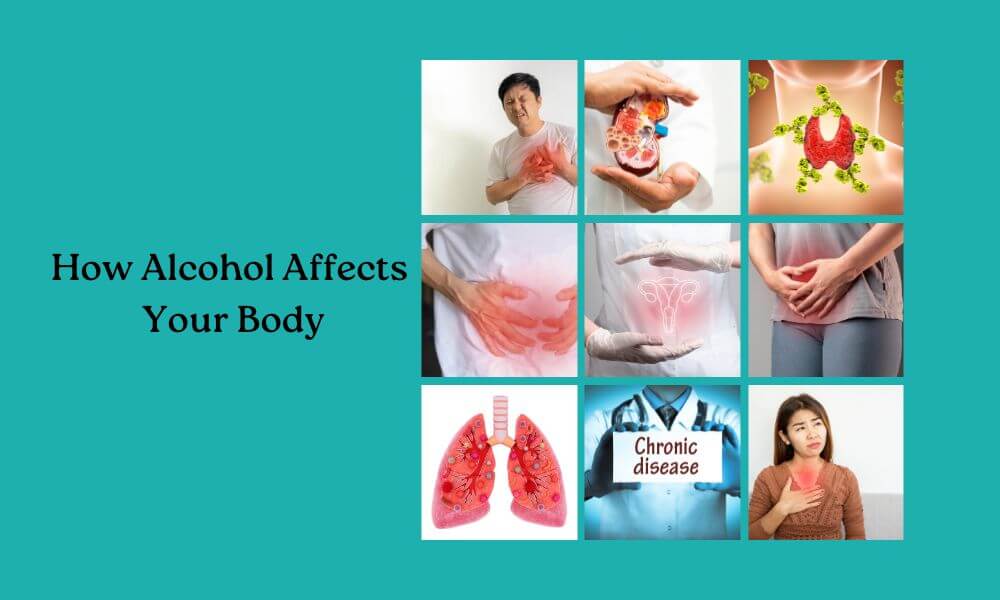In this article we will talk about an important and serious topic – “Effect of alcohol addiction on mental health”. Nowadays, alcohol consumption has become common, but its impact on our mental health is very deep. To get rid of alcohol addiction, we must first understand its effects.
Excessive consumption of alcohol affects both our brain and mental state. This affects our thoughts and behavior, and gradually has a negative impact on our life. In this blog post, we will see what effect alcohol addiction has on mental health and what are the ways to avoid it. Let us discuss this topic in depth.
How alcohol addiction affects mental health
Alcohol has a profound impact on mental health, and its effects last for a long time. Excessive consumption of alcohol affects the functioning of a person’s brain. This disrupts the balance of neurotransmitters, which can lead to problems like mood swings, depression, and anxiety.
Consumption of alcohol also weakens a person’s attention and memory, and decision-making ability is also affected. Apart from this, alcohol also affects a person’s relationships. Due to excessive drinking, a person does not feel like spending time with his family and friends, which also affects his social life.
Consuming alcohol for a long time causes physical and mental addiction to a person, which affects both his life and the life of his family. Therefore, it is important for a person to get the right treatment and support to overcome alcohol addiction.
Understanding Alcohol Addiction

First of all, let us understand what alcohol addiction is. Alcohol addiction is such a bad habit in which a person becomes so addicted to alcohol that it starts affecting his daily life.
There are many reasons behind it like social pressure, mental stress and predisposition to alcohol. Addiction also results in behavioral changes in a person, such as excessive drinking, loneliness, or withdrawal from society.
Your addiction is such a deep affair in which a person gets so trapped in the detoxification of alcohol that his day and night starts spending only with alcohol. This habit engulfs any person without even realizing it and then it affects his life.
There are many reasons which lead a person in this direction. Social pressure such as love pressure or the influence of prevalent culture promotes alcohol addiction.
Mental stress can also be a major reason where a person tries to calm his mind by taking the help of alcohol and then for some people it is also a genetic predisposition in which there is a long tradition of alcohol addiction in their family.
A person’s behavior also changes due to addiction. Some people start drinking more alcohol, some want to walk in solitude or prefer to be alone and some become distant from understanding.
All these changes lead to personal social and mental condition of the patient addicted to alcohol. (how alcohol addiction affects mental health)
Here are some statistics on alcohol addiction in the United States:
- Prevalence:
- According to the 2022 National Survey on Drug Use and Health (NSDUH), 29.5 million people ages 12 and older (10.5% in this age group) had Alcohol Use Disorder (AUD) in the past year.
- This includes:
- 17.4 million males ages 12 and older (12.6% in this age group)
- 12.2 million females ages 12 and older (8.5% in this age group)
- Binge Drinking:
- Over 65 million Americans report binge drinking in the past month, which is more than 40% of current alcohol users.
- Binge drinking is defined as consuming a certain amount of alcohol in a short period of time. For men, it’s consuming 5 or more drinks on a single occasion, and for women, it’s consuming 4 or more drinks on a single occasion.
- Deaths:
- Every day, 385 Americans die as a result of excessive alcohol use.
- According to the Centers for Disease Control and Prevention (CDC), alcohol use disorder (AUD) was responsible for an estimated 178,000 deaths and 4 million years of potential life lost each year on average, during 2020-2021. More than a third of these deaths and nearly half of the years of potential life lost were due to binge drinking.
- Other Impacts:
- Alcohol addiction is a major contributor to a variety of health problems, including liver disease, heart disease, cancer, and mental health issues.
- It can also lead to social problems, such as domestic violence, child abuse, and job loss.
How Alcohol Affects Your Brain

The effect of alcohol is not limited only to the body but it also has a deep impact on our brain. When we drink alcohol, it directly affects certain parts of our brain.
First of all, consumption of alcohol causes neurological changes in our brain. Due to the effect of alcohol, some parts of our brain become calm while some parts face excessive simulation.
This causes disturbance in the functioning of our brain and our understanding and decision. The ability to understand is reduced.
Alcohol affects our neurotransmitter system and brain chemistry. Neurotransmitter systems are communication networks that send messages between different parts of our brain. Due to alcohol consumption, these systems get disturbed, which also affects our emotional state.
Levels of neurotransmitters such as dopamine, serotonin and gamma-aminobutyric acid, which regulate our mood and emotions, also change.
And thirdly, alcohol consumption also affects the cognitive function and emotional regulation of our brain. Cognitive function implies our memory, understanding and decision making ability.
With the consumption of alcohol, this ability reduces and we feel difficulty in understanding and remembering. Emotional regulation means the ability to control one’s emotions and actions. (how alcohol addiction affects mental health)
Due to the influence of alcohol, this decision gets impaired and the person is not able to control his emotions normally, due to which many times absurd actions are also done.
How Alcohol Affects Your Body

The effect of alcohol is not limited only to our brain but it also deeply affects our body. Consuming excessive amounts of alcohol can cause many types of physical harm to our body.
First of all, excessive consumption of alcohol causes our body to face many physical problems such as excessive consumption of alcohol affects the liver and increases the risk of liver problems such as fatty liver crisis or liver cancer. All these problems are serious and can be life threatening.
Secondly, excessive consumption of alcohol also increases the risk of many chronic diseases such as cardiovascular problems which include heart diseases and blood pressure problems.
Excessive consumption of alcohol increases blood pressure and this can lead to heart diseases such as double heart rate. It also increases the risk of heart disease or stroke.
And thirdly, problems can arise when giving up alcohol or during detoxification. When a person gives up alcohol, his body tries to remove the effects of alcohol, during which some people may have problems like restlessness or swelling. (how alcohol addiction affects mental health)
These are common problems at the time of quitting alcohol which bother the person and sometimes their intention to quit alcohol also becomes weak.
To avoid all these problems, it is important that we control the consumption of alcohol and if someone is addicted to alcohol then immediately proceed towards treatment. By consuming excessive amounts of alcohol, we are harming our body and mind, hence avoiding it.
You may like to read on: 15 Powerful Steps to Start Your Drug Addiction Recovery Journey
Alcohol and Mental Health

There is a deep connection between alcohol and mental health and it is very important for us to understand this connection. Consuming alcohol affects our brain and mental state and this effect can sometimes cause mental health problems.
Before we see the solution between alcohol consumption and mental health problems, most people consider alcohol as a kind of stress buster or a solution to reduce mental stress but this is a misconception.
Excessive consumption of alcohol leads to mental stress and can increase anxiety and depression. Apart from this, alcohol consumption causes changes in the neurotransmitter system and brain chemistry of our brain which causes mental health problems.
Secondly, depression and anxiety are the most prominent among the common mental health problems related to alcohol addiction. Excessive consumption of alcohol causes changes in the neurotransmitter levels which can cause problems like depression and anxiety.
Apart from this, excessive consumption of alcohol can make a person emotionally unbalanced. Due to which he feels lonely and uneasy
And thirdly, sometimes there are co-occurring diseases between alcohol addiction and other mental health problems, such as a person may have depression along with alcohol addiction or a person may have anxiety problems. -Alcohol addiction may also occur.
Such disorders are called co-occurring disorders or dual diagnosis, and in their treatment, it is very important to relate the alcohol addiction and mental health problems simultaneously.
Keeping all these elements in mind, it is important that we keep our alcohol consumption under control and if someone is addicted to alcohol or has any kind of mental health problem, then it is important to immediately understand the mental health problems and deal with them. (how alcohol addiction affects mental health)
It is very important to find a solution and for this it is important for us to seek timely help.
Getting Help if You’re Worried About Your Drinking

If you are worried about your drinking habit then its solution is also possible. It is very important to recognize this problem beforehand and find its solution. Here are some things which can help you:
First of all, you have to identify the problem. There are some common symptoms which indicate that your drinking habit may be problematic, such as you start drinking alcohol daily, you do not get relief without alcohol or your daily life is affected by alcohol.
The effects have started but if you notice any of these or any other symptoms, it is important to take action on the problem.
Second, if you or someone you love is struggling with alcohol addiction, then it is important to take action. First, explain to yourself and others that alcohol addiction is a problem and its solution is possible. Provide help and support to the person and motivate them that he can solve this problem. (how alcohol addiction affects mental health)
And third, consider seeking professional help and support. There are a variety of treatment programs and helpline resources available today that treat alcohol addiction and mental health problems.
These programs help you move toward a life free from addiction and provide you with a supportive and understanding Apart from this, you can also contact social service organizations and government agencies around you that can help you in this difficult time.
Remember, alcohol addiction is a problem whose solution is possible. By moving towards timely treatment, you can take yourself and your loved ones towards a new and drug-free life.
Empowering Recovery: Effective Solutions to Stop Drug Abuse
SAMHSA’s National Helpline
The SAMHSA’s National Helpline is a vital resource run by the Substance Abuse and Mental Health Services Administration to help people with alcohol addiction and mental health issues.
The Helpline is a uniquely free and confidential facility, which is available to those who are suffering from alcohol addiction or mental health problems and need support and comfort.
The number of this helpline is 1-800-662-HELP (4357). This is a toll free number which you can call any time 24 hours a day, 7 days a week. Here you will not face any kind of infrastructure problem and you can talk openly about problems.
The resources and support available through the SAMHSA’sNational Helpline can be a vital resource if you are struggling with alcohol addiction or mental health issues and are trying to overcome them. They are the one who will help you understand and solve your problems.
The helpline also provides information about local treatment programs and resources available in your city. These programs help you move toward a drug-free life and provide you with a supportive and understanding family environment.
The SAMHSA’s National Helpline is an essential resource available to people suffering from alcohol addiction and mental health problems. By using this helpline, you can get your life on a new and healthy path and start again your healthy life. (how alcohol addiction affects mental health)
Impact of Alcohol on Mental Health

Alcohol addiction has a deep impact on mental health and can have long-term effects. Here are some key elements to help understand the problem:
First of all, long-term effects of alcohol addiction are serious on mental health. Excessive consumption of alcohol worsens a person’s mental condition and he can become a victim of depression, anxiety and other emotional problems.
Apart from this, alcohol addiction is also associated with Mental health problems that also become difficult to treat in the long term.
Secondly, excessive consumption of alcohol has a serious effect on a person’s brain. Consumption of alcohol causes changes in neurotransmitter levels which causes problems like mood disorders and cognitive impairment.
The person’s behavior also changes and he loses his understanding ability and also loses the ability to make decisions.
And thirdly, it is important to keep in mind that mental health problems in the treatment of alcohol addiction.
Most people see alcohol addiction only as a problem of alcohol addiction, but the emotional and mental health problems hidden behind it should also be kept in mind. It is important to have proper treatment and recovery.
It is important that the mental health problems of the person are also treated so that he can move forward in a life free from addiction.
Keeping all these elements in mind, it is important that timely work is done to understand and resolve the effects of alcohol addiction. To treat alcohol addiction, the person needs to be provided with the right treatment, support and an understanding family environment.
It is very important that by solving the mental health problems related to alcohol addiction in this way, a person can take steps towards a new and healthy life. (how alcohol addiction affects mental health)
Impact on Family and Relationships

Let us discuss the impact of alcohol addiction on family and relationships and its importance.
The influence of alcohol affects human affairs; disputes and distance between the family increases and trust in relationships begins to decrease.
Building healthy and strong relationships with family and rebuilding their trust is very important for an alcoholic. It takes time, wisdom and patience. It is also important to maintain supportive support and understanding with the family. (how alcohol addiction affects mental health)
Some strategies for reestablishing healthy and strong relationships in treatment are:
– Communication and understanding: It is very important to establish communication between the alcoholic person and his family. Through communication and understanding, trust and commitment are rebuilt in relationships.
– Supportive communities: Family and relatives should connect with supportive communities and support groups. They provide them support and understanding and help them find solutions to their problems.
– Professional help: It is important to encourage the alcoholic person and their family to seek professional help. By meeting with a family therapist or counselor, conflicts can be resolved and relationships can be strengthened.
By surrendering all the solutions, trust and prosperity can be established back in your family and relationships. This is the effect of alcohol addiction on family and relationships and some strategies to get out of it.
Legal and Financial Consequences
Addictive use of alcohol not only harms the alcoholic, but it also affects his legal and financial condition. Here are some main topics:
Legal Sections: There are many legal sections related to alcohol addiction, such as DUI (Driving Under Influence) charges and legal penalties. Violating the legal provisions on drunk driving can result in severe penalties, which may even include jail time.
Additionally, there may be other legal sections associated with incidents under the influence of alcohol.
Alcohol addiction not only harms the body and mind, but it can also spoil your financial condition and legal status.
Financial loss:
– Loss of employment: Alcohol addiction can cause you to lose your job, which reduces your income.
– Excessive expenditure: Drinking alcohol costs a lot of money.
– Financial instability: Alcohol addiction can reduce your savings and put you in debt.
Legal loss:
– Driving under the influence: Driving under the influence of alcohol can land you in jail or have your driving license taken away.
– Aggressive behavior: Under the influence of alcohol, you can behave aggressively, which can lead to legal problems.
– Violence in the family: Alcohol addiction can lead to violence in the family, which can lead to legal problems.
To avoid this pitfall:
– Freedom from alcohol addiction: The most important step to avoid alcohol addiction is to get freedom from it.
– Contact the right counselor: If you are troubled by alcohol addiction, do not feel embarrassed to contact the right counselor.
– Act wisely: It is important to act wisely to avoid legal and financial problems.
To avoid the harm caused by alcohol addiction, it is important to take the right steps at the right time. (how alcohol addiction affects mental health)
Mental Effects of Alcohol: Effects of Alcohol on the Brain
Reaching Out for Support and Treatment:

Seeking help and treatment is the first step in addressing alcohol addiction and mental health problems, but often the stigma and restrictions that come with it prevent a person from seeking help and treatment. Here are some key facts that help understand and solve this problem:
First, it is important to overcome the stigma associated with seeking treatment for alcohol addiction and mental health problems.
Many people view alcohol addiction and mental health problems as obscene or demeaning, which makes it difficult to get treatment.
Therefore, it is important that we understand this situation and show courage to deal with it and move towards help and treatment. (how alcohol addiction affects mental health)
Second, there are a variety of treatments available for alcohol addiction and mental health problems. Such as, psychotherapy or counseling, in which a person talks to a therapist about his problems and finds solutions.
Additionally, some people also need medications to treat their mental health problems. And then, support groups also provide an important resource in which individuals seek help from each other in solving their problems.
And third, each person’s response to alcohol addiction and mental health problems is different, so it is important that treatment is planned according to the person’s individual needs and circumstances.
Personalized treatment plans provide the individual with the support they need and help them move towards a drug-free life.
Keeping all these facts in mind, it is important that we move towards help and treatment to address alcohol addiction and mental health problems.
By overcoming the stigma, move towards the right treatment and take your life on a new and healthy path. (how alcohol addiction affects mental health)
Prevention Strategies and Community Support
To avoid alcohol addiction, prevention programs and community support are vital. Here are some main topics:
Prevention Programme: Prevention programs and wrestlers have an important place against alcohol at school and community level.
Through these programs, children are made aware about the ill effects and harms of alcohol and they are taught ways to stay away from it.
Apart from this, various government and non-government organizations also run programs to prevent alcohol addiction and keep the community dedicated.
Community support circles and wrestlers: Community support circles and wrestlers also have importance in combating alcohol addiction. These troupes and wrestlers support and make the people of the community aware.
In addition, community support circles and pehelwans provide help and support to alcoholic persons and their families, thereby establishing their cooperation and rehabilitation.
All these measures help in taking the right direction and helpful steps to deal with alcohol addiction and keep the community safe. With community support and dedication, a supportive and supportive spirit in dealing with alcohol addiction increases.
This is the importance of prevention programs and community support to avoid alcohol addiction. By getting involved, awareness increases in the community and supporting programs result in proper development of the individual, family, and community. (how alcohol addiction affects mental health)
Conclusion:
At last, we have understood how deep the impact of alcohol addiction is on mental health. Therefore, if you or someone you love is struggling with this problem, you need to seek help and support immediately.
Alcohol addiction and mental health problems can be addressed only with early intervention and consistent care. Therefore, do not ignore this problem not only for yourself but also for the people close to you, and always give importance to the health of your mind and body.
Alcohol is not a lifelong companion, start a new journey. The problem of alcohol is not limited to just body and mind, it affects your entire life. But, it is a disease that can be defeated.
In this blog, we learned what effect alcohol has on the body and mind. We also saw that coping with an alcohol problem can be difficult, but it is not impossible.
It starts with you only. If you or someone you love is suffering from an alcohol problem, do not delay in talking to a doctor. Remember, seeking help is not weakness, but strength.
By being free from the bondage of alcohol, you can live a healthy and happy life. (how alcohol addiction affects mental health)
I hope you have liked the information we have shared in our article, to know more about this you can read our other article too.
Frequently Asked Questions
Can alcohol addiction lead to permanent damage to mental health?
Yes, long-term alcohol abuse can cause permanent damage to mental health. Chronic alcohol consumption can lead to conditions such as alcohol-induced dementia and permanent cognitive impairments.
How does alcohol addiction affect the mental health of adolescents differently from adults?
Adolescents are particularly vulnerable to the negative effects of alcohol on mental health due to ongoing brain development. Alcohol use during adolescence can disrupt brain development, leading to long-term issues with memory, learning, and emotional regulation.
Is there a link between alcohol addiction and the development of psychiatric disorders?
Yes, alcohol addiction often co-occurs with psychiatric disorders such as depression, anxiety, bipolar disorder, and schizophrenia. Alcohol can exacerbate symptoms of these disorders and interfere with their treatment.
Can alcohol addiction cause hallucinations or psychosis?
Yes, severe alcohol withdrawal, known as delirium tremens, can result in hallucinations, confusion, and psychosis. Additionally, long-term alcohol abuse can contribute to the development of alcohol-induced psychotic disorder.
Are there any specific risk factors for the development of alcohol-induced mood disorders?
Genetic factors, childhood trauma, and a history of mental health issues can increase the risk of developing mood disorders due to alcohol addiction. Environmental factors such as chronic stress or social isolation can also play a role.
How does alcohol addiction affect the mental health of older adults differently?
Older adults may be more susceptible to the effects of alcohol on mental health due to age-related changes in metabolism and increased sensitivity to alcohol. Alcohol abuse in older adults can worsen existing health conditions and increase the risk of cognitive decline and dementia.